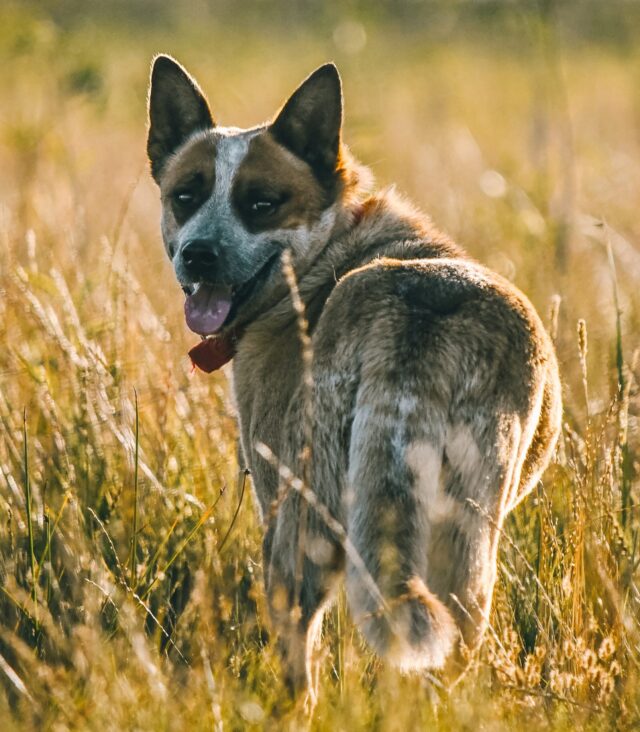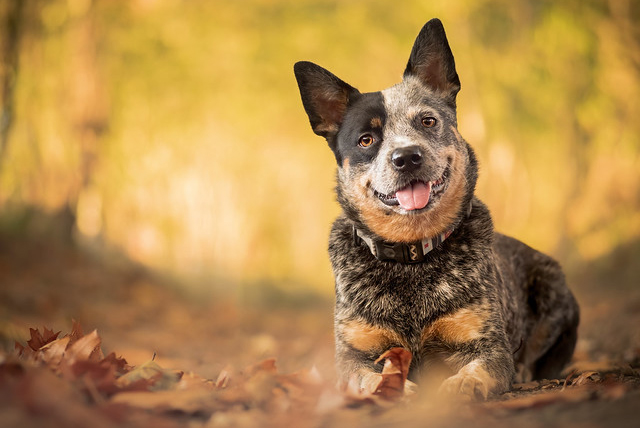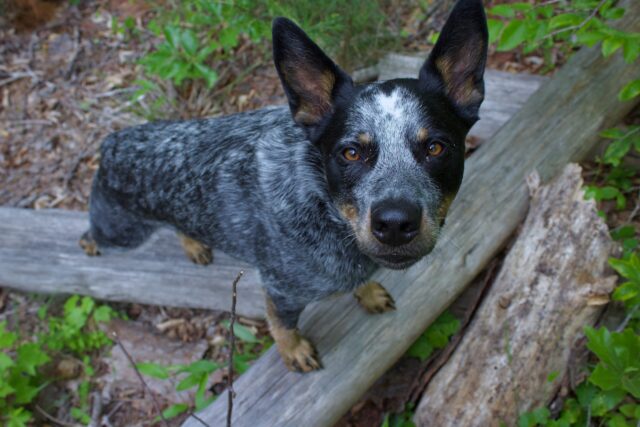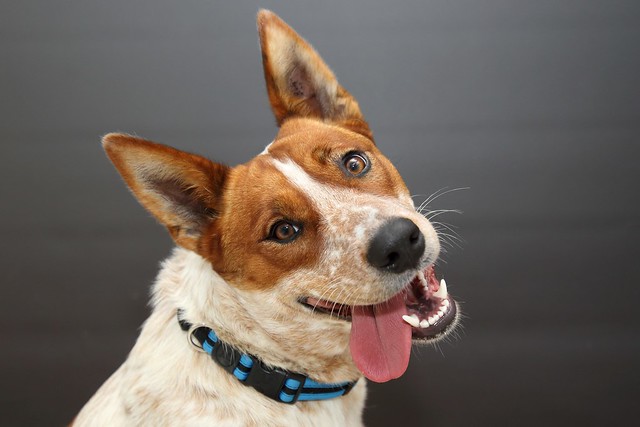iHeartDogs is reader-supported. When you buy via links on our site, we may earn an affiliate commission at no extra cost to you.

Whether you know them as Australian Cattle Dogs or Blue Heelers, these intelligent dogs are an impressive breed. Not only bright, but Heelers are also loyal and loving dogs that will help you complete any task and then be ready for more work! And you’d better always have something for your Australian Cattle dog to do because boredom can equal destruction in this wily pup’s eyes. But that dedicated work ethic is just one of so many reasons you love your Cattle Dog!
Because you want your Heeler at your side for years and years’ worth of adventure, you’ll do anything and everything to keep your best buddy in top shape. And part of that ‘anything and everything’ means annual checkups with the vet to keep your pup fit and healthy. Lucky for Heeler parents, the Australian Cattle dog is one hearty breed. But they can still suffer from health problems like hip dysplasia, liver shunts, urinary stones, lens luxation, and a bleeding disorder known as Von Willebrand’s Disease. Treating any of these problems can get expensive, but you can be financially prepared to fend off whatever comes with pet insurance for your Blue Heeler. To help you find peace of mind and the best pet insurance plan for your Australian Cattle Dog, we’ve created a free and easy-to-use comparison tool to simplify the insurance quest.
Compare The Top 9 Pet Insurance Plans for Your Australian Cattle Dog Using our Free No-Obligation Quote Tool below
The simplest way to compare pet insurance prices is to use our tool below. The comparison tool will show you quotes from the top 9 pet insurance carriers, including Trupanion, Pets Best, Lemonade, ManyPets, FIGO, HealthyPaws, Prudent Pet, Spot, and Embrace pet insurance.
How Much Does Pet Insurance for an Australian Cattle Dog Cost?
Below are some sample pet insurance plans for a 1-year-old male Australian Cattle Dog using the zip code 75001 (Texas) as an example.
- Pets Best – $39.67 per month
- Embrace – $41.60 per month
- Healthy Paws – $30.72 per month
- ManyPets – $36.27 per month
Ultimately, your plan’s premium will depend on several factors, including your dog’s age, size, and breed, as well as where you live. You also want to know what type of coverage your plan has and if it will help with Australian Cattle Dog-specific health problems. Let’s get more into those medical conditions and how much you can expect to pay to treat them.
Common Health Problems Associated With Australian Cattle Dogs
Hip Dysplasia
Hip dysplasia occurs when the ball-and-socket joint in a dog’s hip doesn’t form correctly, leaving the joint to dislocate or the femur head to sit wrong in the socket. The issue eventually leads to pain and decreased mobility. This Australian Cattle Dog health problem plagues many breeds, and once diagnosed, the genetic condition will require lifelong care and management by a veterinarian. Something else to keep in mind, Blue Heelers also have problems with elbow dysplasia.
Portosystemic Shunts
Portosystemic shunts, or PSS, this congenital or acquired condition occurs when blood vessels that should pass through the liver don’t. Instead, these vessels flow directly from the digestive system, sending blood back into circulation without first going through the liver for detox. Also called liver shunts, they can cause symptoms such as neurological problems, digestive issues, and overall poor quality of life.
Urinary Stones
Comprised of different mineral compositions that create rock-like formations, bladder and kidney stones are just what they sound like, and they’re pretty painful! These dreadful stones can range in size from teeny-tiny to impossibly large. Two of the leading indicators your dog has these stones are straining to urinate and bloody urine. Factors that lead to urinary stones in Heelers are genetics, diet, and water consumption.
Primary Lens Luxation
When the zonular ligaments responsible for holding the eye’s lens in place degenerate, the lens can slip or move. This lens dislocation is known as Primary Lens Luxation and can lead to a host of other eye issues, including blindness. If your Heeler suffers from this genetic eye problem, you may notice symptoms such as eye redness, tearing, and lens clouding.
Von Willebrand’s Disease (vWD)
Von Willebrand’s Disease, or vWD, is a hereditary bleeding disorder that occurs when the blood lacks a vital protein that helps with clotting at the site of blood vessel injuries. Dogs with this disease risk losing significant amounts of blood as healing clots don’t form as they should. Excessive blood loss in dogs can quickly become an emergency.
Typical Costs Of Treating Health Issues In Australian Cattle Dogs and How Pet Insurance Can Help
Taking your dog to the vet for annual visits is a bill you expect. But when the vet discovers a problem or emergency strikes, medical bills can stack up fast. With the right pet insurance plan for your Australian Cattle Dog, you’ll be financially ready to deal with any bills, leaving you to concentrate on your best friend’s recovery.
Have a look at what it costs to treat the Blue Heeler health problems mentioned above:
- Hip Dysplasia Costs: Severe cases of hip dysplasia could require expensive surgery with costs ranging between $2,000 – $7,000. And even if your pup doesn’t need surgery, treatment could involve oral medications, injections, and even physical therapy, which can create bills of $500 or more yearly. Treating hip dysplasia can wear away at your wallet, but a pet insurance plan for your Australian Cattle Dog offers financial protection against the high costs of orthopedic problems in dogs by helping with vet bills and prescription medications.
- Portosystemic Shunts Costs: With bills ranging from $2,000 to $12,000, PSS is expensive to treat as dogs will need surgery, medications, and hospitalizations. And before treatment, tests to find PSS include expensive scans and bloodwork. This one health problem in Blue Heelers alone makes pet insurance a worthy monthly expense and removes the need to make heartbreaking decisions in the face of an impossibly high vet bill.
- Urinary Stones Costs: Diagnosing urinary stones could involve bloodwork, X-rays, and a urinalysis. Treatment will depend on the size and quantity of the stones, and in severe cases, afflicted dogs will need to undergo a cystotomy, a surgery that breaks up or retrieves the stones. The price for such a procedure can easily reach $2,000. But with a pet insurance plan for your Australian Cattle Dog, the final cost of surgery to rid your pup of painful stones could be significantly reduced.
- Primary Lens Luxation Costs: The typical course of action for a dislocated lens is an operation in which the damaged lens is removed. And with an average cost of $1,750 for the procedure, the bills can get big fast. The actual bill could be less, but it could also be double that, depending on where you live and if any complications arise. But having a pet insurance plan for your Australian Cattle Dog is a foresight that can save your bank account from surprise eye problems.
- Von Willebrand’s Disease: If your Heeler suffers a bleeding emergency, costs could get high in a hurry. For each unit of blood, you can expect prices that range from $25-$300. The amount of blood lost will depend on how many units your dog will need. Other emergency procedures and hospitalization may be necessary if the case is severe. Between transfusions, stays, and emergency care, this unexpected vet bill could quickly reach prices of $800 to $1,500. But having the right pet insurance plan for your Australian Cattle Dog before emergency strikes lets you concentrate on recovery, not bills.
What Is Pet Health Insurance, And Why Do I Need It For My Australian Cattle Dog?
Pet health insurance works very similarly to human health insurance. Your policy quote will range in monthly price, depending on your dog’s breed, age, and where you live. Typically, you’ll spend around $15-$77 per month as a pet parent.
Pet insurance is mainly about peace of mind, knowing you won’t be totally overwhelmed in case of an emergency. Enrolling even when your dog is young and healthy will ensure you have plenty of coverage when they need expensive medical care later. If you choose a plan more suited to your dog’s particular breed, you’ll be more prepared when something happens later on in their life.

Some plans cover accidents and illnesses, while others only cover accidents. Certain plans do cover breed-specific illnesses, and others do not. It all depends on what type of coverage you choose. With our free pet insurance comparison tool, you can get quotes from multiple insurance companies with no obligation to commit.
Whatever plan you choose, you’ll feel better knowing you can take care of your dog when they need you most. Plus, you won’t have to suddenly shell out thousands of dollars. Learn more about how pet insurance works here.
Pet Insurance Carrier Comparisons
- 9 Best Pet Insurance Plans for Dogs
- Best Cheap Pet Insurance
- Trupanion Vs. Pets Best Pet Insurance
- Trupanion Vs. Lemonade Pet Insurance
- HealthyPaws Vs. Embrace Pet Insurance
- HealthyPaws Vs. Trupanion Pet Insurance
- Embrace Vs. Trupanion Pet Insurance
- Embrace Vs. Lemonade Pet Insurance
- Trupanion Vs. FIGO Pet Insurance
- Prudent Pet Vs. Trupanion Pet Insurance
- Embrace Vs. ManyPets Pet Insurance
- Embrace Vs. FIGO Pet Insurance
- Prudent Pet Vs. Embrace Pet Insurance
- HealthyPaws Vs. ManyPets Pet Insurance
- HealthyPaws Vs. FIGO Pet Insurance
- Prudent Pet Vs. HealthyPaws Pet Insurance
- HealthyPaws Vs. Lemonade Pet Insurance
- Pets Best Vs. ManyPets Pet Insurance
- Pets Best Vs. FIGO Pet Insurance
- Prudent Pet Vs. ManyPets Pet Insurance
- Prudent Pet Vs. Pets Best Pet Insurance
- Embrace Vs. Pets Best Insurance
- HealthyPaws Vs. Pets Best Pet Insurance
- ManyPets Vs. Lemonade Pet Insurance
- Lemonade Vs. FIGO Pet Insurance
- Trupanion Vs. ManyPets Pet Insurance
- ManyPets Vs. FIGO Pet Insurance
- Lemonade Vs. Pets Best Pet Insurance
- Prudent Pet Vs. Lemonade Pet Insurance
- Prudent Pet Vs. FIGO Pet Insurance
Breed Pet Insurance
- Pet insurance for Akitas
- Pet insurance for Alaskan Malamutes
- Pet insurance for American English Coonhounds
- Pet insurance for American Staffordshire Terriers
- Pet insurance for Australian Cattle Dogs
- Pet insurance for Australian Shepherds
- Pet insurance for Basset Hounds
- Pet insurance for Beagles
- Pet insurance for Bernese Mountain Dog
- Pet insurance for Bichon Frises
- Pet insurance for Bloodhounds
- Pet insurance for Border Collies
- Pet insurance for Boston Terriers
- Pet insurance for Boxers
- Pet insurance for Bulldogs
- Pet insurance for Bullmastiffs
- Pet insurance for Bull Terriers
- Pet insurance for Cane Corsos
- Pet insurance for Cavaliers
- Pet insurance for Chesapeake Bay Retrievers
- Pet insurance for Chihuahuas
- Pet insurance for Chinese Crested Dogs
- Pet insurance for Chow Chows
- Pet insurance for Cocker Spaniels
- Pet insurance for Collies
- Pet insurance for Corgis
- Pet insurance for Dachshunds
- Pet insurance for Dobermans
- Pet insurance for Dogue De Bordeaux
- Pet insurance for English Springer Spaniels
- Pet insurance for French Bulldogs
- Pet insurance for German Shepherds
- Pet insurance for German Shorthaired Pointers
- Pet insurance for Goldendoodles
- Pet insurance for Golden Retrievers
- Pet insurance for Greyhounds
- Pet insurance for Great Danes
- Pet insurance for Great Pyrenees
- Pet insurance for Havanese
- Pet insurance for Huskies
- Pet insurance for Jack Russells
- Pet insurance for Labrador Retrievers
- Pet insurance for Labradoodles
- Pet insurance for Lhasa Apsos
- Pet insurance for Maltese
- Pet insurance for Mastiffs
- Pet insurance for Miniature Pinschers
- Pet insurance for Mixed Breeds (small)
- Pet insurance for Mixed Breeds (medium)
- Pet insurance for Mutts
- Pet insurance for Newfoundlands
- Pet insurance for Old English Sheepdogs
- Pet insurance for Papillons
- Pet insurance for Pekingese
- Pet insurance for Pit Bulls
- Pet insurance for Pomeranians
- Pet insurance for Poodles
- Pet insurance for Pugs
- Pet insurance for Rhodesian Ridgebacks
- Pet insurance for Rottweilers
- Pet insurance for Saint Bernards
- Pet insurance for Samoyeds
- Pet insurance for Schnauzers
- Pet insurance for Shar-Peis
- Pet insurance for Shelties
- Pet insurance for Shiba Inus
- Pet insurance for Shih Tzu
- Pet insurance for Staffordshire Bull Terrier
- Pet insurance for Vizslas
- Pet insurance for Weimaraners
- Pet insurance for Westies
- Pet insurance for Whippets
- Pet insurance for Yorkies
Pet Insurance by City
- Pet Insurance in San Diego
- Chicago Pet Insurance
- New York City Pet Insurance
- Pet Insurance in Seattle
- Pet Insurance in Los Angeles
- Pet Insurance in Austin
- Pet Insurance in San Antonio
- Pet Insurance in Miami
- Pet Insurance in Philadelphia
- Pet Insurance in Sacramento
- Pet Insurance in Orlando
- Pet Insurance in San Francisco
- Pet Insurance in Houston
- Pet Insurance in Dallas
- Pet Insurance in Tampa
- Pet Insurance in Pittsburgh
Pet Insurance by State
- Pet Insurance in California
- Pet Insurance in Texas
- Pet Insurance in Florida
- Pet Insurance in Pennsylvania
- Pet Insurance in Washington State
- Best Pet Insurance in Michigan
- State of Delaware Pet Insurance
- Pet Insurance in NC
- Pet Insurance in NJ
- Pet Insurance in Colorado
- Pet Insurance in Ohio
- Pet Insurance in Oregon
- Pet Insurance in Indiana
- Pet Insurance in Oklahoma
- Pet Insurance in Utah
- Pet Insurance in New York
- Pet Insurance in Massachusetts
- Pet Insurance in Arizona
- Pet Insurance in Minnesota
- Pet Insurance in Connecticut
- Pet Insurance in Wisconsin
- Pet Insurance in Hawaii
- Pet Insurance in Iowa
- Pet Insurance in New Hampshire
- Pet Insurance in Alabama
- Pet Insurance in Maine
- Pet Insurance in Maryland
- Pet Insurance in Rhode Island
- Pet Insurance in Arkansas
- Pet Insurance in Illinois
- Pet Insurance in Nebraska
- Pet Insurance in Alaska
- Pet Insurance in Louisiana
- Pet Insurance in South Carolina
- Pet Insurance in Vermont
- Pet Insurance in Georgia


 Toledo, United States.
Toledo, United States.